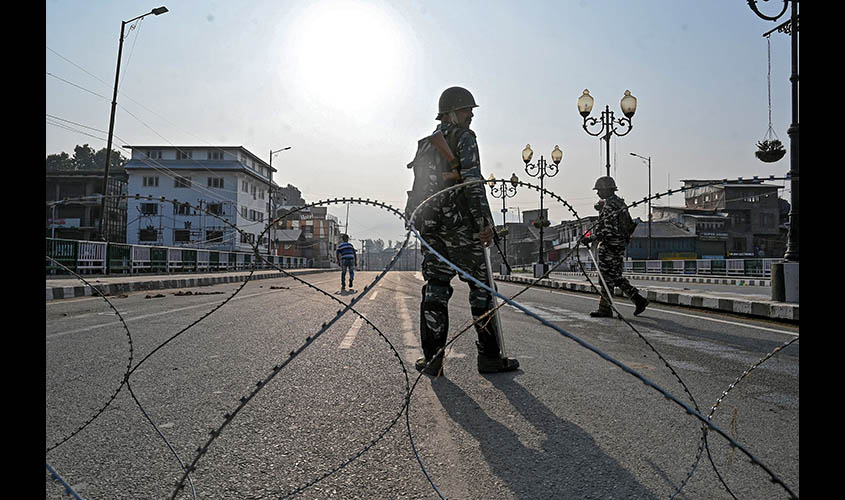Following the much awaited abrogation of the temporary Article 370 and the reorganisation of Jammu and Kashmir state, frustrated Pakistan is leaving no stones unturned to stake its unwarranted claim on Kashmir, where it has no locus standi.
The main plank of the Pakistani stratagem is to build international pressure against India on Kashmir. It has lost its case at the United Nations. It tried but failed to win over US President Donald Trump. So its latest gimmick is the anti-India and pro-jihadi motion adopted by the British Labour Party in favour of a plebiscite in Kashmir. How could the Labour MPs forget that the rogue state of Pakistan is yet to fulfil the basic condition of plebiscite i.e. to withdraw its troops from the so called “Azad Kashmir”—which is the occupied part of Jammu and Kashmir state—in its control. Indeed, the Brexit quagmire has taken a heavy toll on their good sense.
The second plank of this ill-gotten Pakistani stratagem is to catapult and use Iltiza, the daughter of PDP supremo Mehbooba Mufti, the political face of the separatists, to discredit India. In this, it enjoys the tacit support of the people and organisations dead-set against the Modi-Shah duo and their government’s firm stand on the abrogation of Article 370.
Iltiza, who sounds like a disgruntled anti-India urban Naxal, is propped up to make bizarre claims and arguments like the one equating the situation in Jammu and Kashmir with that of the Northeast. Now, this is an old trick which Prof Bal Raj Madhok would often dismiss as “both an offensive and defensive mode in psychological warfare” by the anti-integrationists.
In fact, both Jammu and Kashmir and the Northeast have altogether different sets of problems that originated in entirely different historical backgrounds. They present different stimuli at the local level and therefore elicit different responses by the Centre. Approaches tend to vary as per the requirement. This is the fundamental of public administration and governance.
At the same time, it is a defensive posturing by the local Kashmiris, anti-India politicians, separatists, militants and pro-Pakistan agents who are now trying to shift their standard response by pretending to be “better Indians” than the Nagas and Mizos. That means that they are now compelled to identify themselves as Indians.
However, this was not the case when Article 370 was in place and they were shamelessly enjoying all the perks and benefits—the best food and beverages, round the clock security cover and Indian passports for globetrotting—and yet failed to call themselves Indians.
Now they say that they don’t object to the return of Hindus fearing that this will be ensured by the Central government. But where were they when Hindus were forcibly driven out of their hearths and homes? Where were they when they stopped the allotment of 39.88 acres of land to Shri Amarnath Shrine Board for making temporary shelters for Hindu pilgrims? The allotment was cancelled on the ground that it was against forest conservation. Thus, when Hindus were not allowed to make even temporary shelters, how could they be allowed to live there permanently?
As regards the so called forest conservation logic, where did it vanish when opium cultivation behind the trees was brazenly allowed in the forest and when precious timber—sheesham and sagwan—was allowed to flow down the river Chenab to Pakistan, a practice that continues even today?
As things are, thousands of illegal Rohingya Muslims have got settled in the state. They were allowed to settle while Hindus were not. Kashmiri Pandits’ demand for a separate demarcated zone or homeland in South Kashmir, which Prof Madhok strongly advocated, was vehemently opposed by the state authorities under the Islamisation drive started by Sheikh Abdullah.
The special status, rights and privileges given under Article 370 suited Kashmiri Muslims and their anti-India separatist mindset. Ironically, all of them, including Sheikh Abdullah and his kin, are Hindu converts who do not want to co-exist with their Hindu brethren. This is the reason why Jammu and Ladakh on the whole have heartily welcomed the abrogation, while Muslim majority Kashmir valley and Kargil have not.
Unfortunately, things have not improved. Despite much hue and cry over the so called security clampdown, local Kashmiris do not hesitate in helping and sheltering Pakistani infiltrators. They still oppose checking of their households lest the security forces nab the hidden Pak terrorists and ISIS jihadists. If nabbed by the security agencies, they try to hide the true identities of these Pakistan agents by calling them their relatives. Why?
However, the bigger question is as to why media should give undue publicity to people prone to displaying a ghetto mentality. Kashmiris refuse to recognise the contributions of the Indian Army in securing their lives and call them “Bharatiya Kutte”. It is all right when the Indian Army rescues them from flash floods but not right when their households are searched for hidden Pakistani agents.
Moreover, this talk of Kashmiri culture and tradition being subsumed is nonsense. Where were they when the Kashmiri Pandits, the custodians of Kashmiri culture and tradition, were thrown out; where were they when Kashmiri language, the carrier and vehicle of Kashmiri culture; Dogri of Jammu and Boddhi of Ladakh were replaced by Urdu?
Would Mehbooba Mufti and her ilk care to respond to these pressing concerns before unleashing her anti-India diatribe through proxy?

